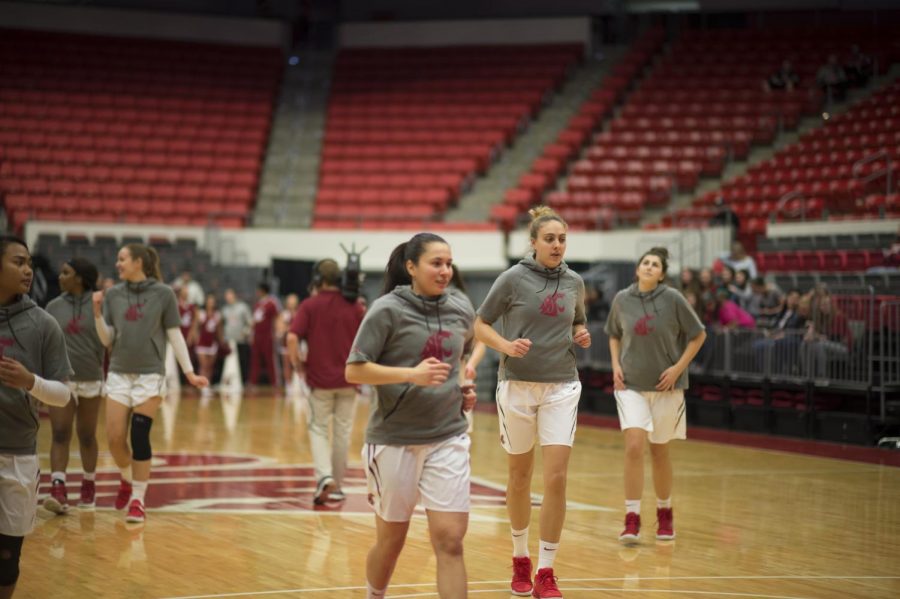Athletics should take part in community outreach, engagement
Athletics department should fill stadium by being more involved among fans, students
GEORGE RODRIGUEZ | The Daily Evergreen
WSU women’s basketball players warm up right before a game against California Thursday at the Beasley Coliseum. Most of seats available for attendees are empty.
February 28, 2018
Last semester, I circled campus three or four times before giving up and going home.
I had an important meeting, and I needed to find parking, but the buses were getting rerouted, and people from out of town now had priority on campus. RVs swarmed. Roads were blocked. People were decked out in WSU football gear — people whose season passes cost significantly less than my own tuition.
We love our sports teams, but WSU seems to be trying to push athletics on its students and even neglecting them during major sports events. While last semester we were unable to get to our classes, this semester we dodged the bullet of being charged for a mandatory sports pass.
I love football. I was born and raised a die-hard Green Bay Packers fan in Wisconsin. But as a fan, I noticed that WSU needs to take a different approach to gaining student support. A mandatory sports pass would have increased our student loans, which are already inflated, and shouldn’t have crossed the minds of athletics officials.
Students are separated from their teams. Yes, they are classmates, and yes, the roster ebbs and flows with the tide of recruitment, but there is more to it that needs to be addressed.
Right now, faculty positions are being lost, along with resources for students. We are cutting programs because of overspending, but then we’re hiring new coaches.
During Friday games, we are kicked off our own campus. Affected parking lots are closed for students and faculty at 1 p.m., despite them paying hundreds of dollars for their parking passes. This is when most of us are in class, forcing us to choose between missing lectures and fighting to get on campus.
WSU is catering to everyone outside of the school, but hardly anyone within it.
Athletics needs to create a stronger connection with students. We are the ones paying for most of these teams. Encouraging and recognizing student ownership of our teams would help them gain support without forcing it upon us.
We want our teams to be ours. We don’t want to be obligated to pay for sports passes; we want to want them. The fact that we are being pushed aside is creating a divide between the athletes and the rest of the community, and that isn’t fair to either side. And at the same time, we don’t want the school to sacrifice faculty positions and important jobs to pay for additions to our teams when the budget is the school’s problem.
“It’s a cultural change that needs to happen,” said Yong Chae Rhee, an assistant professor of sports management. “If the students demand it, then the university will have to give. But ultimately, it’s a money game.”
But WSU is choosing to cater to the big wallets instead of filling the stadium with students who want to be loyal to their teams.
This doesn’t only pertain to football. We have plenty of teams that could benefit from this level of support. The more the students can connect to their teams, the higher the support will be. It will increase our attraction for enrollment, give us even more loyal alumni and bring out a bigger fan base in the school and community. There is no downside to this.
“Building the community and treating the students right is one of the most important things to getting them to pack the stadium and getting more supporters for the teams,” Rhee said.
Loyalty to the Packers runs deep. Volunteers work concessions, with a percentage going back to the community. If the team can’t get to practice due to the snow, volunteers will shovel their hearts out.
We do this because of how involved the team is with our community. Players go Christmas shopping with kids, host youth outreach camps and mentor-protege programs that pair emerging businesses with experienced companies to encourage growth.
We don’t have to be a nonprofit like the Packers, but we can be more connected to our teams, and forcing it on the students is not going to do this.
But student-athletes can’t do this on their own. Even if they want to be involved, the athletics department has such a stranglehold on them that they cannot act as individuals supporting the community.
The responsibility is on athletics to change. We want to support our teams, but we don’t want them forced on us.






















